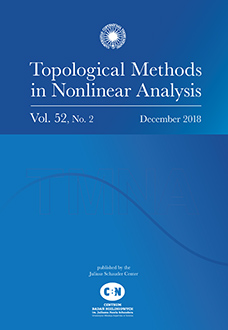Abstract
Consider the following elliptic system \begin{equation*} \begin{cases} -\Delta u_i+\mu_i u_i=|u_i|^{2^*-2}u_i+\lambda \sum\limits_{j=1,j\not=i}^ku_j &\text{in }\Omega,\\ u_i=0,\quad i=1,\dots,k,&\text{on }\partial\Omega, \end{cases} \end{equation*} where $k\geq2$, $\Omega\subset\mathbb R^N$ ($N\geq4$) is a bounded domain with smooth boundary $\partial\Omega$, $2^*={2N}/({N-2})$ is the Sobolev critical exponent, $\mu_i\in\mathbb R$ for all $i=1,\dots,k$ are constants and $\lambda\in\mathbb R$ is a parameter. By the variational method, we mainly prove that the above system has a ground state for all $\lambda> 0$. Our results reveal some new properties of the above system that imply that the parameter $\lambda$ plays the same role as in the following well-known Brezis-Nirenberg equation \begin{equation*} \begin{cases} -\Delta u =\lambda u+ |u|^{2^*-2}u &\text{in }\Omega,\\ u=0 &\text{on }\partial\Omega, \end{cases} \end{equation*} and this system has a very similar structure of solutions as the above Brezis-Nirenberg equation for $\lambda$.
Citation
Yuanze Wu. "On finding the ground state solution to the linearly coupled Brezis-Nirenberg system in high dimensions: the cooperative case." Topol. Methods Nonlinear Anal. 53 (2) 697 - 729, 2019. https://doi.org/10.12775/TMNA.2019.018





